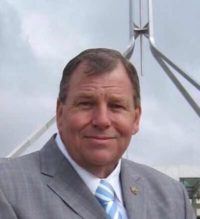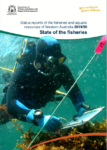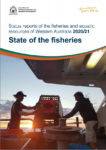
“Lesson to all government experts:
Fish stocks won’t increase whilst you allow the commercial sector to fish during the species spawning whilst shutting out recreational fishers!“
AFTA Chairs Report December 2022
It is that time of year again when we wait with a great deal of anticipation for the Christmas rush and then the Boxing Day spend and for that sweet music of the till ringing up sales (well, that was how it was pre-electronic payments).
We pray for kind & safe weather over this holiday period that allows everyone to participate in recreational fishing at all levels, beginners and experts alike.
Your AFTA board has worked extremely hard during the year, a lot of it behind the scenes, to minimise legislative changes impacting recreational fishing around the country.
I want to thank members for their support in helping me do what I do for our industry and none less so than WA Members Tim Farnell, Brian Marshall & Ash Ram, who have tirelessly driven the agenda with the WA Demersal Fishing issues. I must also mention Director Kord Luckus & President Michael Starkey for the great work on the QLD Spanish Mackerel issue.
If AFTA had not been at the table during these issue meetings with Ministers and Departmental heads, we know the results would have been very different.
So to all, I wish you, your family and your team a very Merry Christmas and a prosperous New Year. I sincerely hope you get some quality time to enjoy wetting a line with family and friends
Tight Lines
Bob
Around the Nation:
Western Australia
Fisheries Minister Don Punch has now delivered his decision on demersal fishing closures.
A 6-month ban to commence with the new rules will be in effect for recreational fishers on 1 February 2023.
And yet you would have to ask … where are the Economic Impact statement and the Social Impact statement on the fishing closures???
Business viability is at risk, and jobs are at risk, not just in the recreational fishing retail trade but the broader regional tourism market, not to mention the broader community risk of Mental Health that participating in Recreational Fishing helps to address.
This is a decision by Fisheries Minister Don Punch, surrounded by controversy.
The WA Auditor General in the “Regulation of Commercial Fishing Report“ released just the day after the Minister’s announcement slammed the Department of Primary Industries and Regional Development on being far too close to the commercial sector to monitor compliance objectively and adequately.
The report states in its “Recommendations” to the Government that the Department:
- ensure it can understand its own regulatory compliance monitoring and enforcement performance and identify required improvements by introducing regular analysis, management reporting and evaluation of its regulation functions (across all sectors). This builds trust and confidence in decisions that are taken across all fish resources and sectors
and
- strengthen its integrity framework by:
- developing and formalising strategies to mitigate the risk of industry capture
- ensuring the framework reflects integrity risks specific to fishery officers and the industry
- ensuring complaints about conduct are investigated independently
and in conclusion:
The Department has significant engagement with the fishing industry, but its regulatory compliance monitoring and enforcement of commercial fishing laws are only partially effective.
With such a close relationship, how can the recreational fishing sector trust that there has been an impartial and objective decision across the industry?
AFTA is informed that the Minister was espousing a 50% cut back on commercial fishing hours yet has allocated a total of 19,109 hours available.). The 2000-2021 State of the Fisheries report shows 8440 fishing hours (page 68):
The WCDSIMF fished for ~8,440 hours in 2020, decreasing from ~9,160 in 2019. The majority of the effort in 2020 occurred in the Mid-west (~5,260 h), followed by the Kalbarri (2,100 h) and South-west areas (1,100 h). Since 2009, annual entitlement to fish (hours) consumed by the WCDSIMF in the Kalbarri, Mid-west and South-west areas has ranged from 68-77%, 53-69% and 36-51% of the maximum, respectively.
 And the 2019 – 2020 State of the Fisheries report shows 9,160 fishing hours (page 69):
And the 2019 – 2020 State of the Fisheries report shows 9,160 fishing hours (page 69):
WCDSIMF fished for ~9,160 hours in 2019, an increase from ~7,060 in 2018. The majority of the effort occurred in the Mid-west (~5,260 h), followed by the Kalbarri (2,600 h) and South-west areas (1,300 h).
So, a 50% cutback equates to an increase of 48% in hours over last year’s effort; perhaps the Auditor General should examine the maths relied upon for this!
Again, as all have advised the Minister, the fish stocks won’t increase whilst you continue to allow the commercial sector to fish during the species spawning whilst shutting out recreational fishers!
AFTA continues to press the need for level heads and common sense to prevail.
Victoria
With the election now over, it was no surprise that the Andrews Government was returned from a recreational fishing perspective. A good track record and a plan that will help grow recreational fishing into the future.
AFTA congratulates Minister Sonia Kilkenny MP for her work and looks forward to working with her as she continues representing Victorian recreational fishers.
The ALP committed an additional $96 million over this term of Government, made up of $2.7 million to grow the fishing community, $74.5 million in better fishing and boating infrastructure and $18.75 million for better fish stocking and aquaculture.
AFTA see the $2.7 million to grow the fishing community as a key component of the future of participation, with $1.5 million to fund 60,000 “Little Anglers Kits” for primary-school-aged kids. The kits will include a fishing rod, tackle box and a Kids’ Guide to Fishing – setting families up with the basics they need to go fishing. This, combined with $1.2 million for a new “Angling Club Grants Program” to support local fishing clubs to attract new members are significant initiatives to address recreational fishing’s future.
Perhaps the Government can take onboard the Coalition commitment to centralise the management of boat ramps across Western Port and Port Phillip Bay and to ensure 100% of ALL fees collected from marine, boating and fishing licence fees are for recreational fishers across Victoria. That would be a plus for boaters and fishers alike.
NSW
The NSW Parliament has risen until after the next election. AFTA have urged the Government and the Opposition to adopt the following issues/policies as a part of their policy platform for the election in March 2023.
- Establishing the NSW Women in Recreational Fishing program (WIRF). This program originated in Victoria and has now spread to Qld, a very successful program of engagement and inclusion.
- The need for Western Sydney fishing access. This became very evident during the COVID lockdown experience when people of the west were confined to their LGA. For a population about the same as the rest of NSW, increasing the local fishing opportunities for Western Sydney in Dams & Reservoirs will create more options, which means more tackle sold in that area.
- Jewfish fishery management, proper harvest sharing and reviewing commercial netting practices, and compliance.
- Action on the Great Lakes – Port Stephens Marine Park, a well overdue review.
- The establishment of the next round of Recreational Fishing Havens – just like the last round funded by a loan that the RFL paid off.
- Increase the number of hatcheries and a dedicated marine hatchery to help recruit and stock important recreational species. While stocking is coming out of the research hatcheries, it is nowhere near the levels needed to make a real difference and boost the RFH stocks.
- Improving quality and surety of access in rural and riverine areas. Currently, it’s a multi-departmental minefield and, by default, locks up a lot of areas that should be accessible to our customers. Victoria does this very well with the recent legislative changes allowing access to leasehold waterfront land.
- Qld Spanish Mackerel decision and the potential impacts on NSW with pressure from QLD to close our fishery in line with the QLD DPI.
